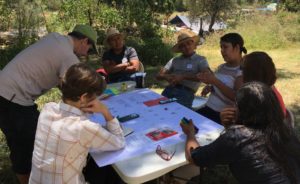Members of the STEPS Centre, including the global consortium, will be presenting at and facilitating various sessions at Transformations 2019 in Santiago, Chile. The conference is a fantastic opportunity for researchers to gain insights from the experiences and findings of the Pathways project and to engage with the work of STEPS members.
If you are planning on attending the conference, please come and find us at the following sessions:
workshop: TRANSFORMATION LABORATORIES AS SPACES FOR CO-DESIGNING SOCIAL-ECOLOGICAL TRANSFORMATION
 The conference organisers have coorindated a series of TransAction Pre-Conference Workshops. Members of STEPS Latin America and North America hubs are co-facilitating a workshop entitled ‘Transformation Laboratories as spaces for co-designing social-ecological transformation: learning from different contexts and approaches.’ This workshop will bring together a wide range of participants to engage in dialogue, exchange of experience and exploration of T-Labs, and to critically assess its potential to support processes of socialecological transformation.
The conference organisers have coorindated a series of TransAction Pre-Conference Workshops. Members of STEPS Latin America and North America hubs are co-facilitating a workshop entitled ‘Transformation Laboratories as spaces for co-designing social-ecological transformation: learning from different contexts and approaches.’ This workshop will bring together a wide range of participants to engage in dialogue, exchange of experience and exploration of T-Labs, and to critically assess its potential to support processes of socialecological transformation.
When: Tuesday 15th October, from 9 AM to 5 PM (GMT-3).
Where: Antumapu Campus of the University of Chile (Avenida Santa Rosa 11315, La Pintana, Santiago).
More information: Visit the Transformations 2019 website. You can read the workshop abstract here.
Transformative Disaster Recovery
This session includes a presentation by members of the TAPESTRY research project.
When: Thursday 17 October, 10:30 – 12:00 (GMT-3)
Room: 1605, Torre 15
Chair: Mark Pelling, King’s College London
- La Gloria de tu vida volverá: Transdisciplina y transformación comunitaria postdesastres. (Sonia Pérez, Paulina Aldunce, Enrica Conte, Fernanda Flores, Claudia Fuentes, Valentina Stark, Karina Quiñones, Eduardo Saavedra)
- Transformations for Rural Resilience I: Community, Networks and Social Capital in a Post-Disaster Context. (Nicholas Craddock-Henry, Joanna Fountain, Franca Buelow)
- Challenges for Transformational Adaptation in a Scenario of Increasing Fire Risk in Valparaiso, Chile. (Rodolfo Sapiains Arrue)
- The Interdependent and Cascading Impacts of Disaster. Deborah Anne O’Connell, Russell Wise, Rachel Williams, (Nicky Grigg, Seona Meharg, Michael Dunlop, Veronica Doerr, Jacqui Meyers)
- Transformation as Praxis: Responding to Climate Change Uncertainties in Marginal Environments in South Asia. (Shilpi Srivastava, Hans Nicolai Adam, Ranit Chatterjee, Rohan D’Souza, Synne Movik, Lars Otto Naess, Karen O’Brien, Nobuhito Ohnte, Devanathan Parthasarathy)
NEGOTIATING EPISTEMOLOGICAL FRAMEWORKS AND NORMATIVE COMMITMENTS ACROSS A TRANSFORMATIVE KNOWLEDGE NETWORK
This is a session organised by the Pathways network. The session has two parts.
Part 1
When: Wednesday 16 October, 11:10 – 12:45 (GMT-3)
Where: FAU Auditorium
1. Introduction. (Adrian Ely)
2. Reflections on Theory, Methods and Action – The Role(s) of Researchers in Transformations to Sustainability. (Adrian Ely)
3. Bioleft: A Story of Emerging Change First Led by Academics but Now Co-Owned by a Complex Network of Actors. (Anabel Marin, Patrick Van Zwanenberg, Almendra Cremaschi)
4. Mobilized Publics, Contradictory Interests and Divergent Imaginations: CoProducing Knowledge and Practices for Sustainable Urban Water Management in Gurgaon, India. (Pravin Kumar Kushwaha, Dinesh Abrol, Bikramaditya Chaudhary, Prachi Jha)
Part 2
When: Thursday 17 October, 10:30-12:00 (GMT-3)
Where: room 2002, Torre 15
1. Introduction. (Laura Pereira)
2. Co-Producing Research and Action for Transformations to Sustainability in Argentina: Can Empowering Logics Also Be Instrumental? (Patrick Van Zwanenberg, Anabel Marin, Almendra Cremaschi)
3. Exploring Collective Agency for Sustainability Transformations: A
Transdisciplinary Process in the Xochimilco Social-Ecological System T-Lab. (Lakshmi Charli-Joseph, Hallie Eakin, J. Mario Siqueiros-García, Beatriz Ruizpalacios, David Manuel-Navarrete, Rebecca Shelton)
4. Understanding the Sustainable Development Prospects of Mobile-Enabled Solar Home Systems in Kenya. (Victoria Chengo)
5. Social Impact of Environmental Policies and Economic Green Transitions in China – A Case Study of Hebei. (Lichao Yang)
For more information, see the conference programme.
RELATIONAL AND PSYCHOLOGICAL DIMENSIONS OF AGENCY
This is a session organised with members of the STEPS North America hub and Latin America hub.
When: Wednesday 16 October, from 11:10 AM to 12:45 PM.
- The Relationship Between Social Capital and System Transformation. (Esther Carmen)
- Procedural Fairness as an Enabler of Transformative Collaboration. (Gail Francis)
- Loss and Change: Emotional Roots in Transformation and Collective Action. (Hallie Eakin, Rebecca Shelton, Lakshmi Charli-Joseph, Jesus Mario Siqueiros Garcia, David Manuel-Navarrete, Beatriz Ruizpalacios)
- Sailing into Transformational Change: Making Safe Spaces for Leadership Development on Homeward Bound. (Deborah Anne O’Connell, Sophie Adams, Kylie Lewis, Fern Hames)
- Seeds of Transformation: Change Strategies Towards More Sustainable Seed Systems. (Almendra Cremasachi, Anabel Marin, Patrick van Zwanenberg)
APPLYING TECHNOLOGIES OF THE SELF IN TRANSFORMATION LABS TO MOBILIZE AGENCY
This is a presentation from members of the Pathways network as part of the Parallel T-Practice Sessions.
When: Thursday 17 October, 4:30 PM – 6:00 PM.
Presenters: David Manuel-Navarrete; Lakshmi Charli-Joseph; Hallie Eakin; Mario Siqueiros García; Adrian Ely.
Social, Political & Cultural Complexities
This session includes a presentation from STEPS Europe Hub member Marina Apgar (IDS)
When: Friday 18 October, 8:30 AM – 9:45 AM.
Where: Room: FAU Central Hall
Chair: Bruce Goldstein, University of Colorado Boulder
- An Interdisciplinary, Integrative Future Outlook on Meat Alternatives: Desirability and Plausible SocioTechnological Pathways of Change. (Barbara van Mierlo, Cor van der Weele, Peter Feindt, Atze-Jan van der Goot, Martinus van Boekel)
- Identifying Actors, Activities and Networks for Transformation in a Post-Disaster Context. (Nicholas Cradock-Henry, Franca Buelow, Joanna Fountain)
- Participatory Complexity-Aware Approaches that Support Transformative Pathways for those Left Behind. (Marina
Apgar, Eric Kasper, Pedro Prieto Martin) - On Matryoshkas and Meaning-Making: Understanding the Plasticity of Climate Change and Contemplating What
this Might Mean for Transformation. (Gail Hochachka) - Homeward Bound: Leadership, Science, Strategy and Gender in Antarctica. (Deborah O’Connell, Mary-Anne Lea, Justine Shaw)
